| Article ID | Journal | Published Year | Pages | File Type |
|---|---|---|---|---|
| 7252234 | Personality and Individual Differences | 2014 | 6 Pages |
Abstract
Anger has been shown to be a motivating factor in aggression and it is widely accepted that driving anger may lead to aggressive driving. However, the link between anger and aggressive driving is likely to be mediated by drivers' pre-existing cognitive biases and the subsequent situational evaluations made. This study investigated the extent to which optimism bias, illusion of control beliefs and driver anger predict self-reported hostile driving behaviours. A total of 220 licensed drivers (106 men; 114 women) completed a self-report questionnaire measuring trait driving anger, optimism bias, illusion of control and driving behaviour. Structural Equation Modelling showed that trait driving anger and illusion of control beliefs account for 37% of the variance in hostile driving behaviour scores. Optimism biases were unrelated to hostile driving behaviours. Thus, driving anger propensities and feelings of control over the situation, but not a general tendency to underestimate the likelihood of adverse outcomes, predict aggressive driving.
Related Topics
Life Sciences
Neuroscience
Behavioral Neuroscience
Authors
Amanda N. Stephens, Keis Ohtsuka,
